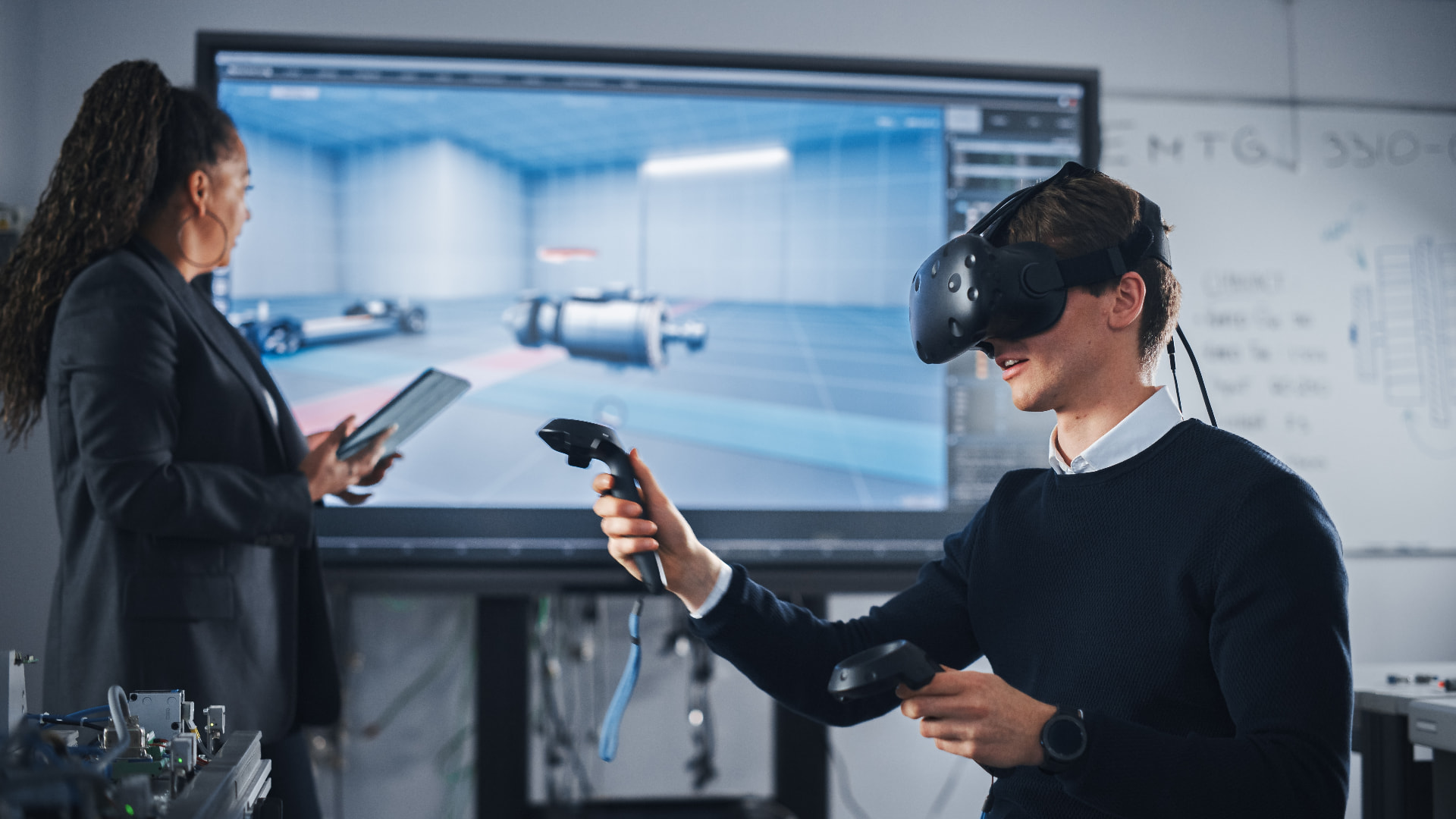
Navigating the way ahead.
Indiana Wesleyan University began initial experimentation with a virtual reality (VR) class taught concurrently with a typical online education course through IWU National & Global. The first virtual reality class, taught by Dr. Jesiolowski, was a basic sociology course called Introduction to Sociology. Dr. Jesiolowski teaches the Online Bachelor of Social Work Program and is the subject matter expert over Introduction to Sociology, Social Welfare Organizations, Social Policy, and Social Research.
Inspiration to create a VR course came from Jesiolowski's daughter who seemed bored with online education. Dr. Jesiolowski felt convicted to make the Introduction to Sociology course more engaging to students. He compiled a meta-analysis of Game-Based Learning, Method of Loci, and Virtual Reality published in an article, “Ready Student One!” and found the thriving new field had no applications in the Behavioral Sciences field. His course development utilizing virtual reality to teach content has proven effective and engaging. The pilot course in August ’23 brought deeper understanding of the content to the students. Thanks to thought leaders like Dr. Jesiolowski, IWU is navigating the way ahead in emerging technologies.
What is virtual reality in education?
Virtual reality technology is an experience produced by both computer hardware and software. In education, software is developed by educators or software developers and drives the virtual reality experience. The hardware are the tangible pieces students interested in taking VR courses must acquire.
What hardware is required for VR?
VR Headsets
One essential component to the VR learning experience is a headset which completely covers a student's field of vision with a screen. The screen display is a 3D image. The headset is also equipped with sensors to identify movement so the screen can change based on the student's movements.
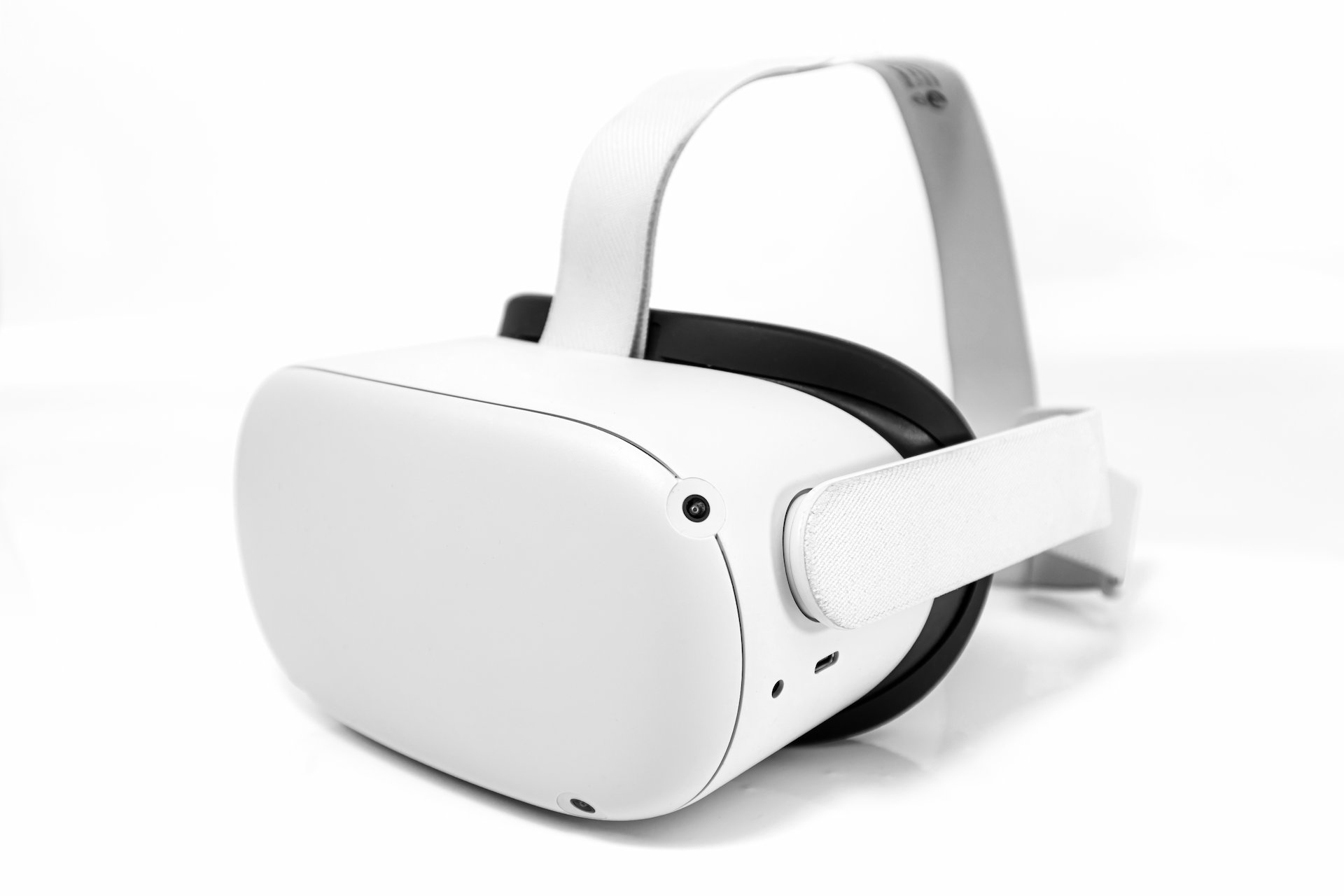
VR Controller
A handheld controller helps guide the student through virtual environments. Selections can be made providing students options as they navigate their way through the learning experience.
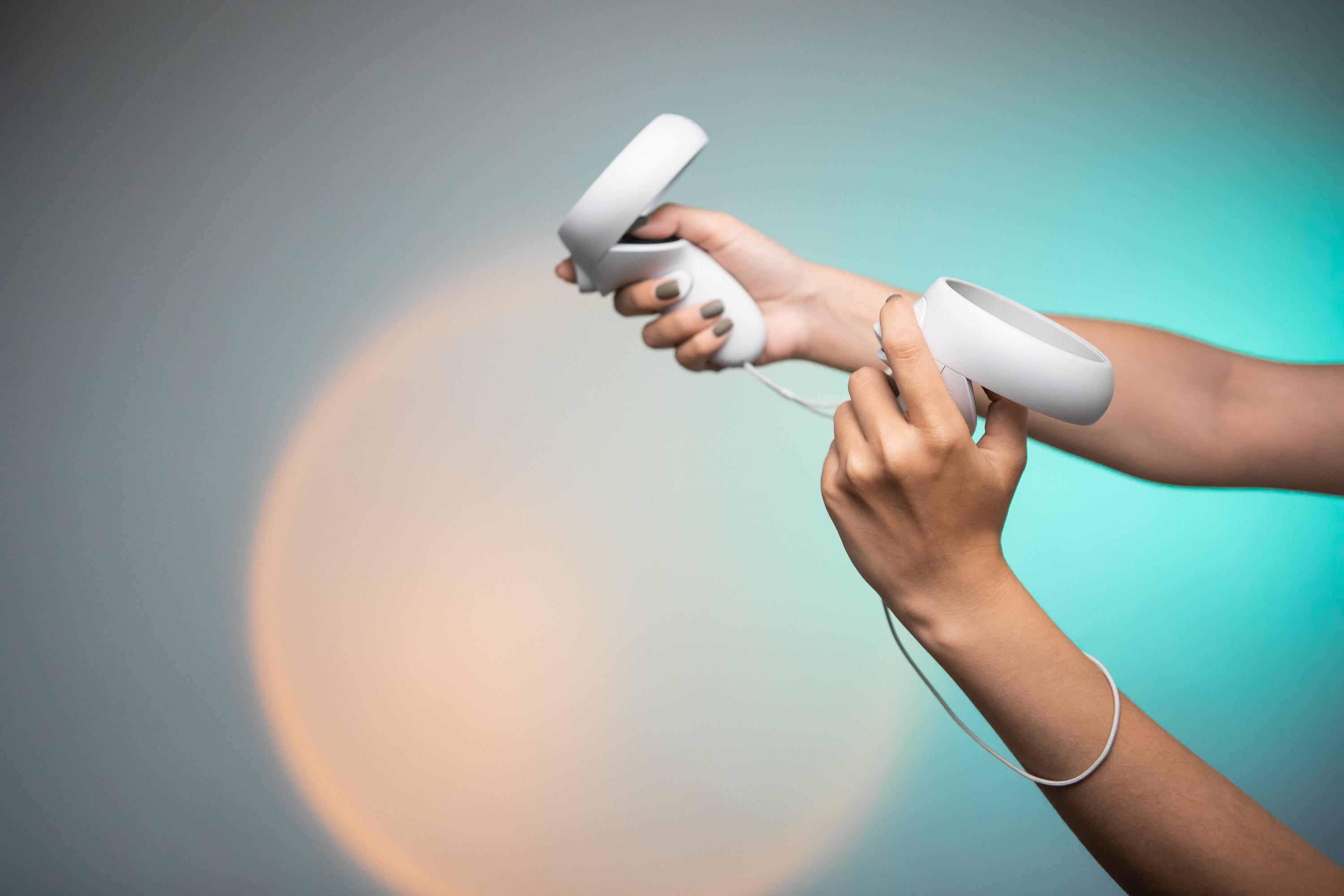
Who creates the software for VR technology in higher education institutions?
Professors and thought leaders in specific fields of study reimagine the learning experience by transforming their textbook into an education "world." Sometimes, these educators partner with agencies who specialize in virtual reality environments to gain the most beneficial student outcomes while effectively utilizing emerging technologies.

Is virtual reality the future of education?
IWU's developments in VR content caught the attention of VictoryXR, a leading project development agency with the goal to blend virtual reality and education. So far, VictoryXR has created over 240 VR and AR experiences in more than 50 different learning units. Their award-winning products are developed in education partnerships with institutions like Oxford University and Carolina Biological. Steve Grubbs, host of the Victory XR Show interviewed Indiana Wesleyan’s Dr. Robert Jesiolowski who developed a VR class to better engage online students in the study of sociology. The potential positive impact of VR on the future of the education is exciting.

How does Dr. Jesiolowski use VR technology for increased student engagement?
Dr. Jesionowski’s goal was to create an experience for a student to be immersed in a VR simulation of a community called “Curios City” where students learn important sociological concepts and apply them in a practical way. These choices and applications within the virtual world experience help engage students as the community grows and thrives because of their actions in the virtual world.
How do students learn through a VR experience?
Switching teaching methods from classroom to VR community
IWU supported the creativity of Dr. Jesionowski as he began to reimagine his online class pedagogy. He first swapped out the traditional learning management system through which students receive assignments, contribute to discussion boards, and submit papers and instead switched to a VR learning management system through which a student creates an avatar and moves through a “city” like they would through the course, allowing students an alternative format of learning in a controlled environment and immersive education. In this way, students make decisions as a character, thus emotionally processing the advanced educational concepts presented. Another important change is moving students from directed, linear education to competence-based assessment that gives students autonomy over their learning path.
Learning experience: problem solving vs. homework submissions
The VR city became the new learning management system for Dr. Jesiolowski’s students. Various locations in the city would contain various aspects of the class. Through the VR experience, a student learns about homelessness by traveling to a park in the VR city. Or to learn about inequality, students travel to the welfare department. At each location, students are introduced to characters with real problems needing solved. The student helps make decisions based on these VR experiences and reflect on what they learned or how they connected emotionally to the experience. Through these encounters, students comprehend key objectives of the class.
Improve student outcomes
One student, appreciated the learning style of the VR classroom. The student deals with ADHD and epilepsy and found the VR method of learning engaging and helpful. The VR courses are not linear like the typical online class with specific topics designated for specific weeks. A student can choose to enter a VR space of their choice, allowing them to navigate the course on their own pace and in the order that appeals to them. If they struggle in one aspect of the VR experience, they can try again and learn from their mistakes. This is creating positive sentiment toward building knowledge through a safe and controlled environment and Dr. Jesiolowski sites, “Our students scored dramatically higher in the VR course than they do in the regular class.”
Students completing the pilot class sang the praises of game-based learning through VR. They described “the learning a more personal experience” and said, “It added depth to what I was learning.” The interactive class allowed students to feel the experiences through VR rather than simply reading content from a book. Dr. Jesiolowski adds, “When education fails to elicit an emotional response, we lose out on connecting the content to experience which makes it so much more significant.” Another way of intentional connection Dr. Jesiolowski offers is one-on-one opportunities. Students can meet regularly with Dr. Jesiolowski during his virtual office hours in Curios City.
The faith-based learning which is bedrock to IWU also presents a more personal connection. Students responded extremely well to a “Praying in Color” forum with one student noting, “I’ve built a better relationship with God during this course.”
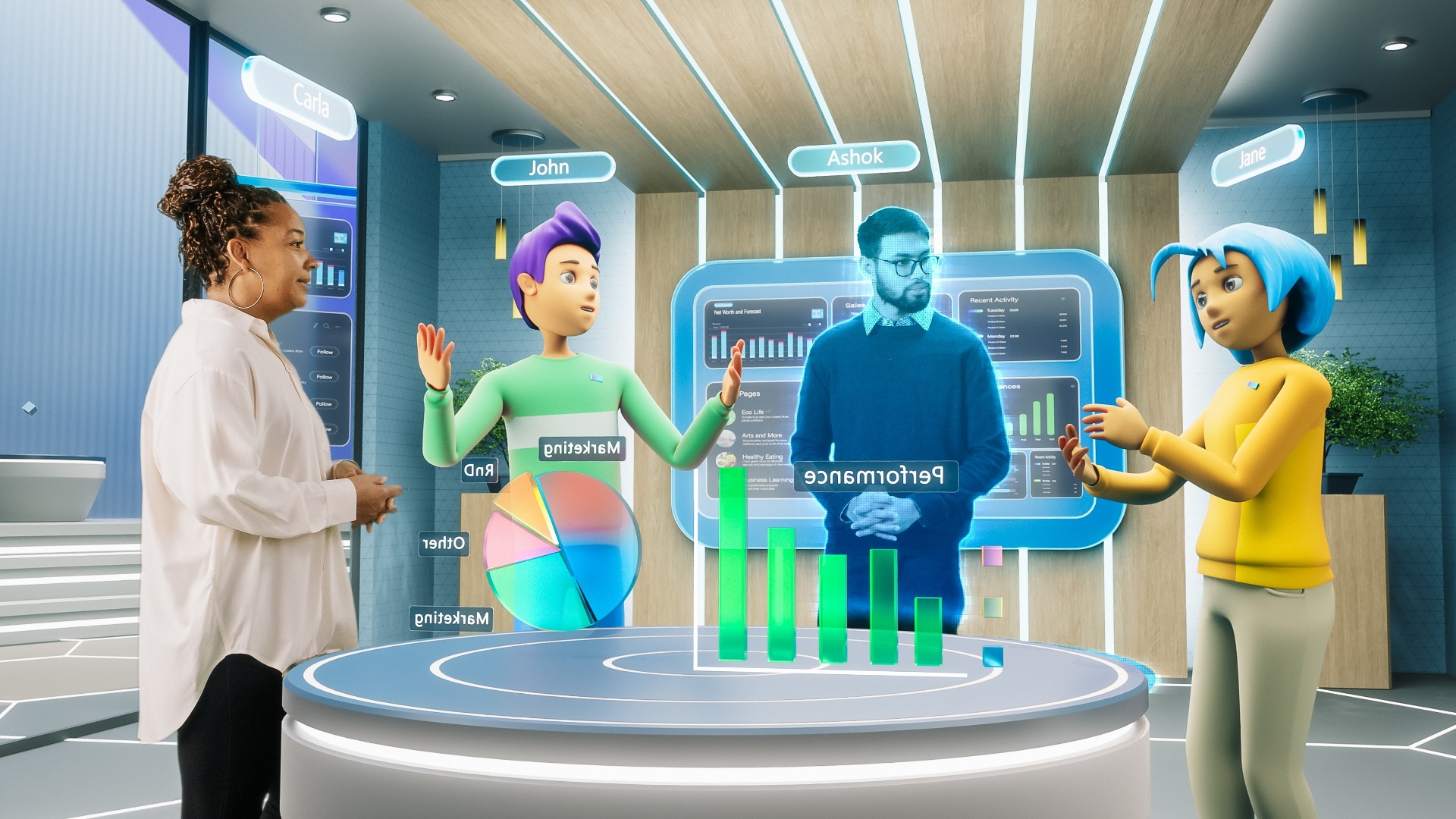
How do students complete a final exam through VR technology?
One example of student success through a VR experience is the final exam. In a typical online class, the final exam would be issued through the computer as a selection test, or short answer or essay test. For the VR assessment, students find “key” people in each section of the city and schedule an appointment to meet in their unique location whether it be an office, courtroom, or church. They enter a dialogue with the person, which is a recorded conversation that goes back to the professor. The conversation surrounds content the student should know in that “unit” or section of town and the dialogue reveals if the student understands the concept. This process serves to help assess student outcomes at a higher level of Bloom’s taxonomy.
One example Dr. Jesiolowski offers is the sociology concept of social stratification. If a student enters a key person’s office and is asked about social stratification, the professor can understand the student’s comprehension based on their response. One option for the student, if they are unsure of an answer is to say, “I’d like to reschedule this meeting,” allowing students an opportunity to go back and review concepts for better success at a second conversation.
Dr. Jesiolowski assures the software is built with best practices in education. Through his research and training, his team used a roadmap of best practices when building the VR experience. Thus, the outcomes affirm VR assists in deeper learning and retention.
Virtual reality higher education engages and excites.
Dr. Jesiolowski shares, “I think education should be fun. Learning should be meaningful to us…I think that using a game setting in VR is a perfect way to make these things come alive…we can create an educational system that not only transfers knowledge, but also inspires students to love learning.”
IWU is proud of faculty members like Dr. Jesiolowski who explore the future of education through emerging technologies. His team has presented at several national and international conferences including the Multiverse Sci-Fi & Fantasy Gaming Convention. IWU has also been nominated for a Reimagine Education Award.
What's next for Dr. Jesiolowski? He hopes utilize AI within an Augmented Reality version of the course’s Poverty Project to take the potential learning even further into the future. He plans on using Game-Based Learning and Virtual Reality for the other courses he serves over as a Subject Matter Expert.
“Recent studies in higher education show that game-based learning improves student motivation, achievement, & confidence,” claims Jesiolowski. He plans to continue to develop technologies for use in his classroom. His next Intro to Sociology class offered in a VR format begins in November ’23.
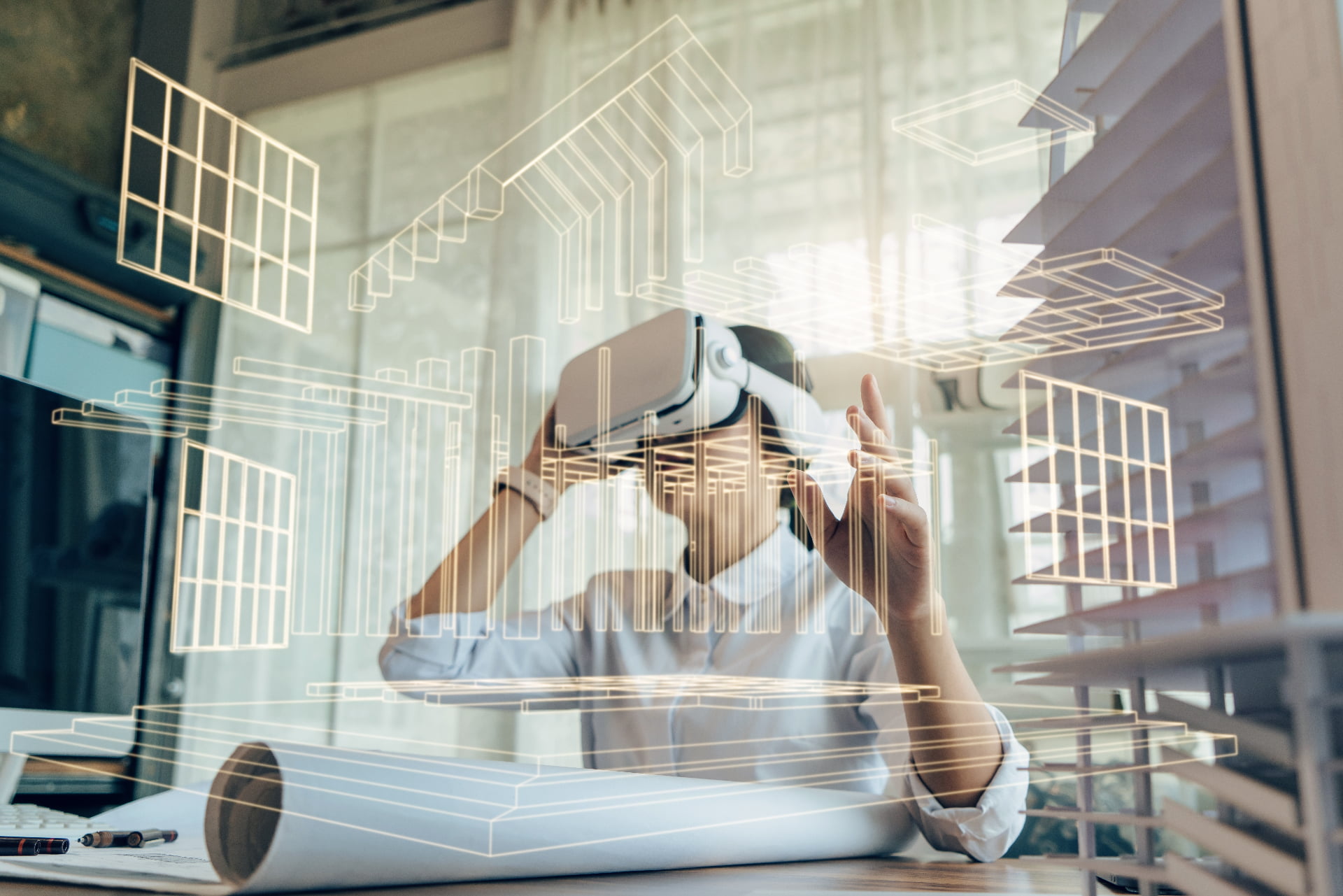
Navigating the way ahead.
IWU commits to optimized learning environments which encourages student engagement and provides students with a variety of learning modalities. Virtual reality creates a safe and controlled environment and a pathway for innovation and deeper learning. IWU is excited to navigate the way ahead in virtual reality exploration.
Interested in learning through a VR classroom? Enroll in Dr. Jesiolowski’s class today! Get started at https://www.indwes.edu
